|
|
|
Sort Order |
|
|
|
Items / Page
|
|
|
|
|
|
|
| Srl | Item |
| 1 |
ID:
136154


|
|
|
|
|
| Summary/Abstract |
In the UK the rules governing caretaker situations have historically been underspecified. The UK's constitutional traditions, such as prime ministerial discretion to time elections and its two-party system, have in the past limited the frequency and duration of caretaker periods. However, the recently lengthened election timetable, new constraints on the executive introduced by the Fixed-term Parliaments Act (2011), and a decline in the dominance of the two largest parties are raising the risk that the UK will experience caretaker periods more often and for longer stretches of time. In this paper, we offer an analysis of the UK's current caretaker provisions and conclude that the existing conventions are insufficiently detailed and can render such periods problematic and controversy-prone. Important lessons, we suggest, can be learned from reforms in other Westminster systems, and from the caretaker rules of other countries.
|
|
|
|
|
|
|
|
|
|
|
|
|
|
|
|
| 2 |
ID:
138279
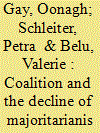

|
|
|
|
|
| Summary/Abstract |
The United Kingdom has traditionally featured many aspects of the majoritarian model of democracy: its first-past-the-post electoral system tends towards producing single-party majorities, while its legislative decision rules concentrate policy-making power in the hands of the resulting single-party governments. However, in an unprecedented break with the UK's postwar conventions, the Conservatives and Liberal Democrats formed a coalition following the general election of 2010. In this article, we examine some of the Coalition's impacts on governing and constitutional conventions, placing them in a comparative European context. We conclude that the Coalition reflects a shift towards the less majoritarian forms of politics prevalent in continental Europe, and that some of these changes are likely to persist even after the end of the current government.
|
|
|
|
|
|
|
|
|
|
|
|
|
|
|
|
| 3 |
ID:
133238
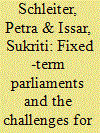

|
|
|
|
|
| Publication |
2014.
|
| Summary/Abstract |
The Fixed-term Parliaments Act significantly reduces the powers of the Prime Minister to manage the risk of government termination and to time elections to his or her party's advantage. In this paper we ask how the Act is likely to change the way in which governments terminate, their durability and opportunities for planning in government and departments. In answering these questions we draw on quantitative comparative evidence from other European countries that operate with fixed-term parliaments. Our analysis suggests that fixing the parliamentary term can be expected to convert some opportunistically called elections into regular elections and to stabilise governments toward the end of the parliamentary term. But the Act is also likely to have unanticipated consequences in increasing governments' vulnerability to failure before they reach the final sessions of Parliament. We explore these unanticipated consequences and outline their implications for governing style and Civil Service planning
|
|
|
|
|
|
|
|
|
|
|
|
|
|
|
|
| 4 |
ID:
155410
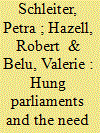

|
|
|
|
|
| Summary/Abstract |
The general elections of 2017 and 2010 produced hung parliaments in which no single party could command an overall majority; in May 2015 the UK only narrowly avoided that outcome. When a parliament is hung, more than one potential government can be viable, and the constitutional rules that determine who has the first right to form the government can thus have a decisive influence on which government forms. In the past, the UK has applied several potentially contradictory rules (based on conventions and principles), which do not all follow an equally democratic logic. This status quo is problematic because it can generate political controversy and uncertainty, in addition to jeopardising the Monarch's role in the government formation process. A reform that enables parliament to elect the leader who will be tasked with the formation of the next government would resolve these problems and provide constitutional clarity.
|
|
|
|
|
|
|
|
|
|
|
|
|
|
|
|
| 5 |
ID:
174691
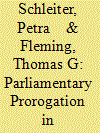

|
|
|
|
|
| Summary/Abstract |
This paper examines the power to prorogue (or suspend) Parliament following the 2019 prorogation controversy in the UK. We outline the legal basis of prerogative‐based prorogation, survey its uses in the UK and other Westminster systems, and compare it with equivalent rules in other European parliamentary democracies. The comparative perspective highlights the outlier status of the UK among comparable European democracies. In the UK, the absence of explicit legal limits on the use of prorogation gives the executive exceptional scope to employ the power for political purposes to sidestep Parliament. We conclude by discussing the implications of these findings for current discussions about the desirability of reforming the UK’s prorogation rules and placing express legal limits on the executive’s power.
|
|
|
|
|
|
|
|
|
|
|
|
|
|
|
|
| 6 |
ID:
089897


|
|
|
|
|
| Publication |
2009.
|
| Summary/Abstract |
Control over government portfolios is the key to power over policy and patronage, and it is commonly understood to lie with parties in European democracies. However, since the democratic transitions of the 1990s, Europe has had nearly equal numbers of parliamentary and semi-presidential regimes, and there is evidence that the ability of parties to control government posts in these two regime types differs. As yet, political scientists have a limited understanding of the scale and causes of these differences. In this article a principal-agent theoretical explanation is proposed. Data are examined on 28 parliamentary and semi-presidential democracies in Europe that shows that differences in party control over government portfolios cannot be understood without reference to the underlying principal-agent relationships between voters, elected politicians and governments that characterise Europe's semi-presidential and parliamentary regimes.
|
|
|
|
|
|
|
|
|
|
|
|
|
|
|
|
| 7 |
ID:
179770
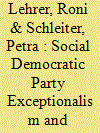

|
|
|
|
|
| Summary/Abstract |
Political parties learn from foreign incumbents, that is, parties abroad that won office. But does the scope of this cross-national policy diffusion vary with the party family that generates those incumbents? The authors argue that party family conditions transnational policy learning when it makes information on the positions of sister parties more readily available and relevant. Both conditions apply to social democratic parties. Unlike other party families, social democrats have faced major competitive challenges since the 1970s and they exhibit exceptionally strong transnational organizations—factors, the authors contend, that uniquely facilitate cross-national policy learning from successful parties within the family. The authors analyze parties’ policy positions using spatial methods and find that social democratic parties are indeed exceptional because they emulate one another across borders more than do Christian democratic and conservative parties. These findings have important implications for our understanding of political representation and of social democratic parties’ election strategies over the past forty years.
|
|
|
|
|
|
|
|
|
|
|
|
|
|
|
|
| 8 |
ID:
157541
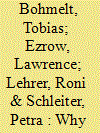

|
|
|
|
|
| Summary/Abstract |
Previous research suggests that political parties learn from and emulate the successful election strategies of governing parties in other countries. But what explains variation in the degree of influence that governing parties have on their foreign counterparts? We argue that clarity of responsibility within government, or the concentration of executive responsibility in the hands of a dominant governing party, allows parties to learn from the most obviously electorally successful incumbents. It therefore enhances the cross-national diffusion of party programs. To test this expectation, we analyze parties’ policy positions in twenty-six established democracies since 1977. Our results indicate that parties disproportionately learn from and emulate dominant, high-clarity foreign incumbents. This finding contributes to a better understanding of the political consequences of government clarity and sheds new light on the heuristics that engender party-policy diffusion by demonstrating that the most visible foreign incumbents, whose platforms have yielded concentrated power in office, influence party politics “at home.”
|
|
|
|
|
|
|
|
|
|
|
|
|
|
|
|
|
|
|
|
|